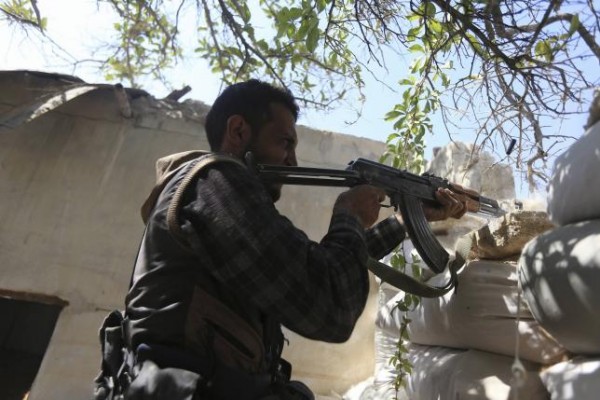
The attacks, in which the Islamic State (IS) group killed 130 people in Paris, has caused a u-turn in French public opinion that many fear can only benefit Assad’s regime.
What was unimaginable just a month ago has become a reality: French Foreign Minister Laurent Fabius, who has consistently been a staunch opponent of Assad’s regime (whom he holds responsible for the civil war in Syria), said on Friday that Assad’s army could indeed play a role in the international fight against the IS group.
Damascus takes heart
“The troops on the ground cannot be ours,” he told France’s RTL radio, referring to the need for air strikes to be backed up by infantry. “[But they can be] Syrian soldiers from the Free Syrian Army, Sunni Arab States, and why not regime troops.”
He did stress, however, that any such cooperation was dependent on an “urgent political transition in Damascus”.
The Damascus regime was quick to capitalise on his comments. Syrian Foreign Minister Walid Muallem told a press conference in Moscow that France’s apparent change of heart was “better late than never”.
Since the Paris attacks, France has been making a big diplomatic push to forge a ‘grand alliance’ against the IS group.
France and Russia have now agreed to “coordinate” their air strikes and to “increase information sharing”, despite their profoundly different visions of Assad’s role in a post-war Syria.
Bitter pill for Syria’s rebels
The IS group has therefore relegated to second place France’s demand, echoed until now by allies such as the UK and USA, that Assad must be excluded from any long-term political plan for Syria.
This is bad news for opposition rebel groups that have been fighting the Assad regime for the past four years. These groups, who have relied on moral and material support from the West, are now uncertain what the future holds for them.
“The Syrian opposition is going through a very difficult period,” François Burgat of the France-based Research Institute for Arabic and Muslim Studies (IREMAM) told FRANCE 24.
“The Paris attacks have already clouded public perception in the West, which is now more than ever unable to distinguish between the IS group and other opposition factions that may be Islamist but are not jihadist militants,” he said. “The opposition rebel groups are living their darkest days since the beginning of the civil war.”
Russia’s bombing campaign in Syria, which began at the end of September 2015, had already put these groups in an extremely precarious situation. Moscow declared that the IS group is the target of its raids, but many of its air strikes in Syria have reportedly been against rebel forces. Assad is a long-time ally of the Kremlin.
Some of these groups have appealed directly to Russia to stop. The Southern Front, which is part of the opposition, even begged Russia to stop bombing its positions in a YouTube video. To make sure their message was understood, the video was made in Russian.
Bringing al Qaeda’s al-Nusra Front in from the cold
The future of material contributions to the various rebel groups are complicated by another powerful armed group fighting both the IS group and the Damascus regime: the al-Nusra Front, which has been the Syrian branch of al Qaeda since 2013.
Indeed, al-Nusra’s status among the various opposition groups has been improved by the global consensus that fighting the IS group must be the top priority in Syria, to the extent that Khaled Khoja, head of the Syrian National Coalition, on Thursday publicly called on al-Nusra to renounce its al Qaeda links.
“I call on the respectable revolutionaries in this [al Nusra] group to come back under the flag of the Syrian Revolution so that we can save our country from further destruction,” he said.
According to François Burgat, calling al Qaeda’s Syrian fighters “respectable” underlines the “paradox of their status in Syria”.
“Because of their behaviour in Syria, in particular towards the local population, they suddenly appear as the kind of ally that Western countries, including France, can do business with,” Burgat said.
Al-Nusra is also the corner stone of the “Army of Conquest”, a federation of rebel groups that has enjoyed a string of victories in northern Syria since the beginning of 2015.
The group is considered by many factions within the rebels as an ally in the fight against Assad primarily because it has not sought to implement a “caliphate”, which is the stated aim of the IS group.
“Only its historic links to al Qaeda are preventing al-Nusra from becoming an integral part of Syria’s republican opposition,” said Burgat. “It is no surprise therefore that [Syrian National Coalition head Khaled Khoja] should call on the group to align itself with Syria’s rebel opposition effort. This would make the group a far more palatable proposition for Arab and Western support.”
If France and its western allies wish to see a post-war Syria without Assad at the helm, non-IS Group rebels need to be supported.
“But if the option to remove Assad from power is shelved, as looks increasingly likely as France positions itself with Russia, the destiny of these rebel groups looks dark indeed,” Burgat concluded.
FRANCE24

Leave a Reply
You must be logged in to post a comment.